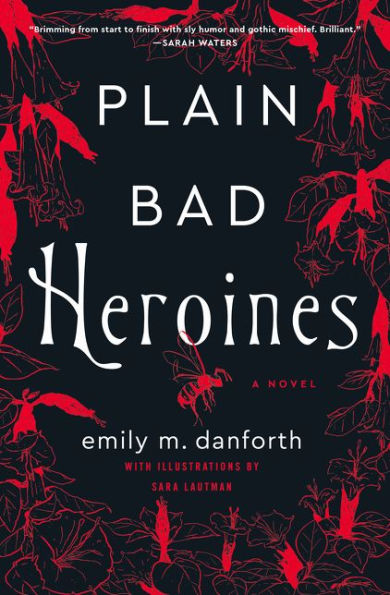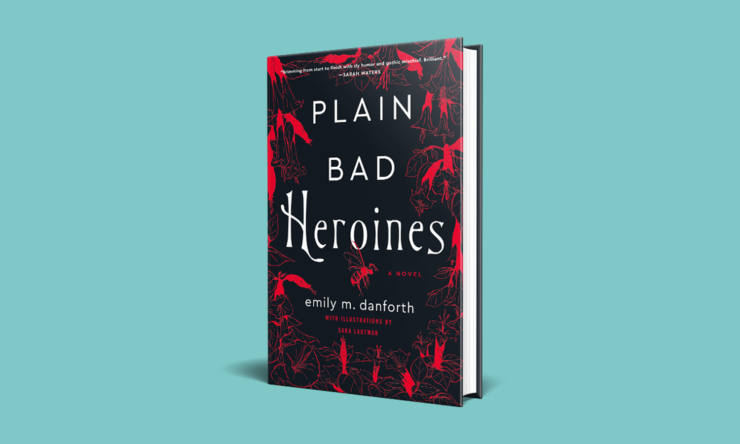Curses are stories are histories, and Plain Bad Heroines is full to the brim with all three. In 1902 the Brookhants School for Girls witnessed the romance of two students, Flo and Clara, with each other and with Mary Maclane’s scandalous memoir—a romance ending with their gruesome demise in a swarm of yellowjackets. After three more untimely deaths the school closed for good, forgotten until the present, when young Merritt Emmons’s queer novel about Brookhants becomes a breakout bestseller. Hollywood comes calling, bringing along lesbian indie it-girl Harper Harper and former child star Audrey Wells to star in the adaptation. But naturally, when these three young women arrive at the old school grounds to begin filming, the situation goes frighteningly awry.
Plain Bad Heroines is Danforth’s first adult novel and second overall, following the much-beloved young adult book The Miseducation of Cameron Post (2012). Illustrated by Sara Lautman with an echo of Edward Gorey, the book plays luxurious games with the reader, nesting stories within stories (within stories) as the hauntings unfold. Whether it’s the straightforward gothic of the 1902 plot(s) or the compulsive, prickly-sexy contemporary film production’s messy queer attractions, Danforth nails each beat. Plain Bad Heroines is scary, witty, and darkly taunting—without ever losing the core of heart inside the ghoulish cleverness of the prose.
Allow me to drop my critical detachment and say: I fucking loved this book. Readers whose genres of choice are gay novels, gothics or horror, and tricksy metafiction will be satisfied… but so will folks who appreciate the painful, beautiful stories of loss and dissatisfaction that run through the book. Plus it’s genuinely frightening or upsetting at points as the hauntings build, which is worth a lot to me in a spooky novel. From the chapter headings (“Finally, Someone Tends to Those Fucking Plants”) to the grimly sketchy illustrations provided by Sara Lautman that interrupt the text, the book is an experience, and I luxuriated in it.
New England comes to creepy life from the first pages as we range across the grounds of Brookhants to Spite Manor itself, the production team’s tiny houses to the orchard of Black Oxford apple trees. Historical time feels as relevant as contemporary time, no matter which section of the book the reader is immersed within. The characters and plot are doing the most, too, through Danforth’s controlled but exuberant prose. It knows how fun of a book it is, as the narrator’s constant manipulative asides to the reader make clear.
Buy the Book


Plain Bad Heroines
And a significant portion of that fun comes from the protagonists, as each of the women are so well-realized as people—occasional viciousness or badness included. Alex and Libbie are middle-aged lesbians carrying along all the drama of growing apart as they grow older. Their place in the early twentieth century doesn’t make their struggles unfamiliar to us in the present. Meanwhile Audrey, Merritt, and Harper are all artists in their twenties, each of whom feels like a talentless imposter in the world of cultural production. All three of them are disasters in their own right, and as a gay Millennial disaster myself, I felt a kinship.
Another source of delight for me came from the fact that almost the entire cast of characters in this hefty novel is queer. Our protagonists, of course—but also the director of the film Bo Dhillon, the respective best friends Eric and Noel, the film crew with speaking roles (including a person who uses they/them pronouns), Harold Brookhants himself. The social world of Plain Bad Heroines feels like easing into a warm (if dangerous) bath: surrounded by the communal cultures of queerness, perpetually in conflict but also confluence. That’s the world I live in but it’s not a world I see on the page often, particularly not with the precise, cutting observational detail Danforth brings to the table.
For example, consider the Instagram comment thread in the first section of the novel where some gay folks are praising the announcement of the Brookhants film while others are savagely calling it out for being a story where the lesbian lovers die. The mix of gothic horror, grounded in the historical and geographic, with the constant melting connectivity of the present—glossy Hollywood, digital culture, the existence of the celesbian—gets me going so hard. Danforth’s skill in seamlessly knotting those timelines together is nothing short of fantastic, aided by references to the Blair Witch Project, Mary Maclane’s memoir, and Truman Capote’s unfinished novel. The mundane, itchy realism of the contemporary sections ups the ante on the building horror of the text by miles, because it all feels utterly possible.
But let’s return to those Instagram comments—because the debate they sum up is thematically significant. What is the ethical value of fright, trauma, and loss in queer storytelling? Plain Bad Heroines is written in the tradition of the gothic with all the punishment, death, and fear of women’s desire one might associate with the genre… but it’s also steeped in metafictional self-reflexivity that tells the audience how to read it. Curses are stories are histories, and it’s possible to retell and reinterpret them from a position that understands trauma through the potential of the future, without dropping the ugliness off the page.
Spoilers follow.
I had to chew on the closing chapters for a while to get at the implications ghosting around my brain, but I suspect the simultaneously abrupt and sprawled-open ending should be read through the lens of genre tropes. Following the slow growth of the hauntings, the sudden revelations of the curse’s grim origin, Libbie’s death/liberation on the water, and the reunion of our threesome at the movie premiere come fast and loose. It’s overwhelming; I’ve noticed other critics responding with bewilderment. However, I’d argue that’s all part and parcel of the game the book has been constructing with the audience since the first page.
One expects the tale we learn about the lesbian couple whose murder at the hands of the Rash brothers left its poisonous mark on the Brookhants land. One also expects the doom of the young schoolgirl lovers; the following dissolution of the middle-aged sapphics (to steal Danforth’s own turn of phrase) into madness and death is par for the course. When the curse gets its hooks into the trio of queer artists in the present, there are two expected outcomes: either they burn the school to its foundations and escape or they fall under the spell of the curse and meet a grisly end.
Except neither of those things happens. Instead, the trio reunite into their semi-coherent romantic unit at the premiere—hauling the curse along with them—and decide to embrace it together. The ugliness is not gone; the specters of dead women linger. Merritt has inherited the house and will go on to write further novels about it. Erasing the historical realities does nothing, and neither does avoiding them or collapsing into despair over them. But grabbing the mess with both hands and attempting to make space for themselves inside it, carrying the curse together as a communal unit, might offer them a hopeful future.
Plain Bad Heroines is a gothic that leaves them (and us) haunted, changed, but whole together. Ghosts and all.
Plain Bad Heroines is available from William Morrow.
Lee Mandelo is a writer, critic, and editor whose primary fields of interest are speculative fiction and queer literature, especially when the two coincide. They have two books out, Beyond Binary: Genderqueer and Sexually Fluid Speculative Fiction and We Wuz Pushed: On Joanna Russ and Radical Truth-telling, and in the past have edited for publications like Strange Horizons Magazine. Other work has been featured in magazines such as Stone Telling, Clarkesworld, Apex, and Ideomancer.










